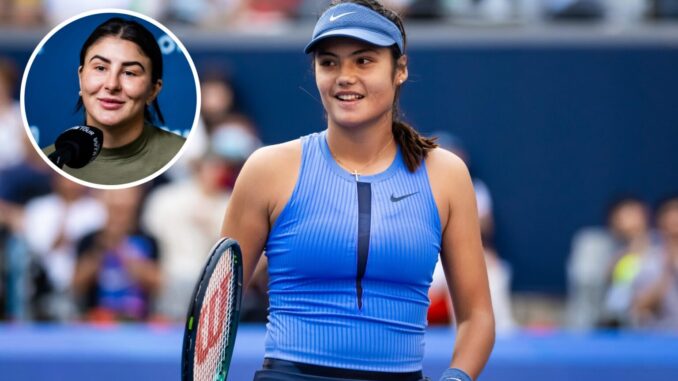
In the relentless arena of professional tennis, where triumphs and setbacks unfold under intense global scrutiny, Emma Raducanu’s 2025 season has woven a compelling narrative of perseverance and revival. The 22-year-old Briton, who soared to fame with her improbable 2021 US Open victory, has navigated a turbulent path of injuries, pressure, and lofty expectations. As the WTA tour’s Asian swing plays out in October’s sweltering conditions, Sloane Stephens, a fellow US Open champion, has voiced her admiration for Raducanu’s recent resurgence, her words a warm tribute to a young star rekindling her brilliance. “It’s inspiring to watch,” Stephens said, her praise a testament to the camaraderie that pierces tennis’s solitary struggles.
Since her historic Flushing Meadows triumph at 18—the first qualifier to claim a Grand Slam—Raducanu’s journey has been a rollercoaster. Once heralded as a prodigy, she faced the daunting challenge of matching her own meteoric rise. Injuries to her wrist, ankle, and back disrupted her momentum, while intense media scrutiny and a series of coaching changes tested her mettle. Now, guided by new coach Francis Roig, the world No. 30 is showing signs of a comeback in 2025. Her performances during the Asian swing—spanning Seoul, Beijing, and Wuhan—have revealed glimpses of the magic that once captivated the world. In Seoul, she pushed world No. 8 Barbora Krejcikova to the edge, holding three match points in a gripping quarterfinal before falling 4-6, 7-6(4), 7-6(6). In Beijing, she traded blows with world No. 4 Jessica Pegula, narrowly missing victory with three match points in a 4-6, 7-6(6), 7-5 defeat. These tight losses, rather than discouraging her, have stoked her determination, with Raducanu emphasizing, “I’m keeping the faith.”
Stephens, the 2017 US Open champion, has followed Raducanu’s comeback with respect, her own career of highs and lows lending perspective. The 32-year-old American, renowned for her powerful baseline play and vibrant personality, spoke before her Wuhan Open matches, praising Raducanu’s tenacity: “It’s inspiring to watch. She’s faced so many challenges with injuries and everything else, and to see her competing at this level again, fighting in these huge matches, it’s truly remarkable.” Stephens’ words reflect her own experience of navigating tennis’s unpredictable tides, from Grand Slam glory to ranking dips and back.
Raducanu’s recent matches have indeed drawn attention. In Seoul, her aggressive forehand and sharp net play tested Krejcikova, her 6-4, 6-7(4), 7-6(6) defeat showcasing her refusal to back down. In Beijing, she challenged Pegula with bold shot-making—a breathtaking crosscourt backhand and a 115 mph serve that left spectators in awe. Though both matches ended in defeat, they signaled a return to form, with improved movement and growing confidence. “I’m playing strong tennis,” Raducanu said after Beijing, her tone resolute despite the losses. “If I keep putting myself out there, the victories will follow.”
Wuhan, a WTA 1000 event with personal significance—Raducanu’s mother is from China—offered a chance to build on her momentum. But the oppressive heat, with temperatures hitting 34°C (93°F) and 70% humidity, proved brutal. Facing American qualifier Ann Li in the first round, Raducanu started strongly, breaking early, but struggled as conditions worsened. Trailing 6-1, 4-1, she took a medical timeout for dizziness and high blood pressure, ultimately retiring—her earliest exit since Indian Wells. Li, advancing to play Ekaterina Alexandrova, expressed sympathy: “I hope Emma recovers quickly. It was tough out there, and I know she’s been through a lot.” Stephens echoed the sentiment, noting, “The conditions are rough for everyone. Emma’s tough—she’ll come back stronger.”
The Asian swing’s grueling schedule has raised concerns across the tour, with players like Iga Swiatek criticizing its intensity. In Shanghai’s ATP Masters 1000, Jannik Sinner retired with cramps, Novak Djokovic battled nausea, and Taylor Fritz struggled, mirroring Raducanu’s challenges. Wuhan organizers adjusted the main court’s roof for shade and paused outer-court matches, but the heat remained relentless. For Raducanu, the setback underscores tennis’s physical demands, yet Stephens’ praise highlights her broader progress: “She’s faced so much, and to see her fighting like this, it’s remarkable.”
Looking ahead to the WTA 500 in Ningbo, Raducanu’s team, led by Roig and strength coach Daniel Pohl, is balancing recovery with competition. A strong finish could earn her Australian Open seeding, a key goal as she approaches her first injury-free Grand Slam preparation in January. Her Chinese heritage adds emotional depth to her Asian campaign, and despite her Wuhan exit, fans cheered her off the court, a sign of her lasting appeal. Stephens’ endorsement—a champion’s recognition of Raducanu’s resilience—carries weight. “It’s inspiring,” she repeated, a nod to a peer rising above adversity.
In tennis’s unforgiving crucible, where every match is a fight and every season a story, Raducanu’s tale is far from over. Stephens’ admiration, paired with Raducanu’s own conviction—“The victories will follow”—paints a picture of a star on the verge of a breakthrough. As the tour shifts from Wuhan’s heat to Ningbo’s opportunities, the tennis world watches, cheering for a player whose spirit, like her game, refuses to dim.
</xaiArtifact>
Leave a Reply